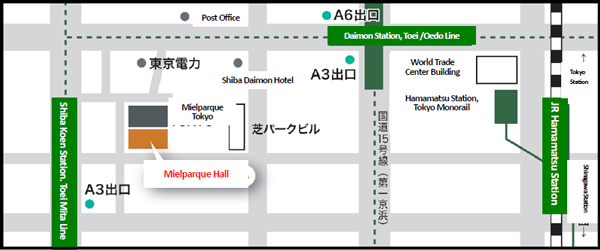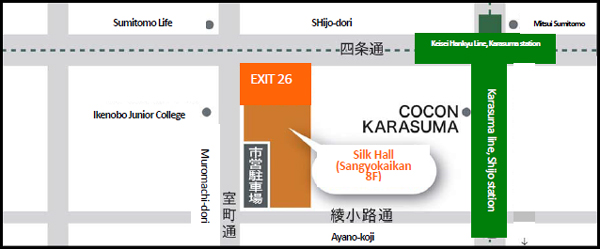National Institute for Environmental Studies (NIES) Public
Symposium 2013: A Borderless Global Environment – movement of atmosphere, life, water and natural resources
April 19 (Friday), 2013
Public Relations Office, Planning Department, National Institute for
Environmental Studies
(Contact: 029-850-2453)
Public Relations Office, Planning Department, National Institute for
Environmental Studies
(Contact: 029-850-2453)
The National Institute for Environmental Studies (NIES) will hold their annual Public Symposium over two Fridays in June, with respective Tokyo and Kyoto chapters to coincide with Environment Month. The theme of this year’s Public Symposium is “A Borderless Global Environment – movement of atmosphere, life,water and natural resources”. We will introduce NIES research outcomes in the diverse fields of atmosphere, biology, water and natural resources as they relate to global environmental issues. Attendance is free.
1. Overview of the National Institute for Environmental Studies Public Symposium 2013
Main Theme: “A Borderless Global Environment – movement of atmosphere, life, water and natural resources”
Summary: Human society is defined by lines of demarcation such as national borders - however no such borders exist when it comes to the global environment. In addition, various movements in the natural world - such as the wind, the tides of the oceans, and the migration of birds across the skies, are now supplemented by activities associated with human society, such as the transit of aircraft and shipping, which define our modern world. The transport of a large range of substances accompanies this movement, and these substances in turn bring with them environmental issues which transcend national borders.
The National Institute for Environmental Studies (NIES) establishes the actual nature of the issues which accompant this transport of substances, and works towards finding their solutions, from a global viewpoint unconfined by manmade boundaries, while maintaining an awareness of temporal scales, in order to effectively foresee the future course of human society. At the NIES Public Symposium there will be five lectures relating to the global environment, and attendees will also have the opportunity to come face-to-face with NIES researchers engaged with such issues at the poster session (19 poster displays are planned).
The poster session will also report on the contributions of activities as part of “Research on Disaster Environment” undertaken at NIES in the immediate wake of the Great East Japan Earthquake. We at NIES are of the hope that our Public Symposium will be a chance to think together about the borderless global environment.
Dates, Times and Venues:
Tokyo Chapter: June 14 (Friday), 2013, 12:00-17:30, Mielparque Hall
Kyoto Chapter: June 21 (Friday), 2013, 12:00-17:30, Silk Hall (Kyoto Sangyo Kaikan, 8F)
2. Program (Same for both Tokyo and Kyoto Chapters)
| 12:00-13:00 | Poster Session (19 poster displays) |
| 13:00- | Opening Address, NIES President SUMI, Akimasa |
| 13:10- | First Lecture: “Changes in global atmospheric carbon dioxide and methane and inference of causes as seen from the GHG observation satellite “IBUKI””, Tatsuya YOKOTA |
| 13:50- | Second Lecture: “Atmospheric substances around the globe: windborne causes of atmospheric pollution and climate change”, Seiji SUGATA |
| 14:30- | Third Lecture: “Ants around the globe – globalization and the issue of invasive alien species”, Koichi GOKA |
| 15:10-15:25 | Break |
| 15:25- | Fourth Lecture: “Japan and the world connected by water – our lifestyles and the world’s water problems”, Naota HANASAKI |
| 16:05- | Fifth Lecture: “Environmental burdens accompanying the international supply chain and resource consumption”,Keisuke NANSAI |
| 16:45 | Closing Remarks: Hideo HARASAWA, NIES Vice President |
| 16:50-17:30 | Poster Session: * As per poster session from 12:00, but with additional participation of symposium speakers |
Poster Session, Titles
- 1. Initiatives towards recovery and restoration from the Great East Japan Earthquake
- 2. Countermeasures for disaster and radioactively contaminated waste for Fukushima
- 3. Town planning for post-disaster regional recovery – environmental energy technologies and policy assessment tools
- 4. Japan Environment and Children’s Study – progress report for the nationwide survey on children’s health and the environment
- 5. Yellow sand from across the oceans and the health impacts of transboundary pollution
- 6. Study towards a toxicity evaluation method using cultured cells of suspended particulate matter
- 7. Particulate matter emissions from gasoline automobiles – compromises between improvement of fuel efficiency and atmospheric pollutants?
- 8. Short term changes in carbon dioxide concentrations in the upper atmosphere – CONTRAIL Project for atmospheric observation using commercial airlines
- 9. Observation of carbon dioxide concentrations in the atmosphere and ocean of the pacific
- 10. Impact of global warming on the Sea of Japan – extreme changes in maritime environments in the past 50 years
- 11. Migratory ecology of freshwater fish in the Mekong, the international waterway
- 12. Long-term trend monitoring of Persistent Organic Pollutants (POPs) in Japanese coastal areas – monitoring activities using bivalves
- 13. Monitoring study for gene recombinant rapeseed
- 14. Investigating the carcinogenic mechanism of inorganic arsenic
- 15. Improvement of household methanation devices for organic waste in the Asian region
- 16. Cobenefit waste water treatment technologies for environmental conservation and material cycles – appropriate treatment of molasses-based wastewater
- 17. Study for a new wastewater management method using bioresponse – using living organisms to test water
- 18. Roadmap for Asian Low Carbon Society – Ten actions toward Low Carbon Asia
- 19. Research on strategies for low carbon Asian cities – case study of the Iskandar Development Region, Malaysia
3. Dates, Times and Venues
Tokyo Chapter: 12:00-17:30, June 14 (Friday), 2013, Mielparque Hall, 2-5-10, Shibakouen, Minato-ku, Tokyo 105-8582, Tel: 03-3433-7221
Access: 10 Minutes walk from JR Monorail Hamatsu Station / 2 minutes walk from Exit A3, Shibakoen Station, Toei Mita Line / 4 minutes walk from Exit A3 or A6, Daimon Station, Oedo Line
Kyoto Chapter: 12:00-17:30, June 21 (Friday), 2013, Silk Hall, Kyoto Sangyo Kaikan 8F, Address: Moromachi-higashihairu, Shijou-dori, Karasumaru, Shimogyouku, Kyoto City, Tel: 075-211-8341
Access: 3 minutes walk from Exit 26, Toei subway, Karasumaru line, Shijou station / Hankyu Railways, Kyoto line, Karasumaru station
4. Application Method
- (1) Official Symposium Site
Register for either the Tokyo or Kyoto Chapters of the NIES Public Symposium at the following page: (http://www.nies.go.jp/sympo/2013/)
A confirmation mail will be automatically dispatched. Please print and bring this on the day for entrance to the NIES Public Symposium. - (2) Mobile Symposium Site (http://www.nies.go.jp/sympo/2013/)
A confirmation mail will be automatically dispatched. Please print and bring this on the day for entrance to the NIES Public Symposium. - (3) Postcard/Fax
Please write your name/contact address/contact telephone number/Fax No./Email address, and whether you wish to participate in the Tokyo or Kyoto Chapters of the NIES Public Symposium on a postcard, or fax these details to the below address/Fax No.
* In order that we can accommodate numbers, we request that you complete the application process as soon as possible
** The symposium will be recorded for our records, and put on the NIES homepage at a future date. We ask for your understanding and cooperation
5. Contact
Administrative Office, National Institute for Environmental Studies (NIES) Public Symposium 2013 Stage Inc., Takamatsu 1-1-11, Toshima-ku, Tokyo (Attn: Sagawa, Inagaki, Kagami)
Tel.: 03-3958-5292 Fax: 03-5966-5773
E-mail: info_nies2013@stage.ac
Tel.: 03-3958-5292 Fax: 03-5966-5773
E-mail: info_nies2013@stage.ac
Privacy Policy
- a) Any personal information submitted will be subject to the NIES security polcy and will not be used for any other purposes than those related to the Public Symposium
- b) Any such information is being submitted to the symposium hosts, the National Institute for Environmental Studies
- c) Applicants may be sent information on the next symposium. However the dispatch of such information can be cancelled immediately on request.
Below: Images from the NIES Public Symposium 2012












0 Comment :
Post a Comment
Thanks for your comment!